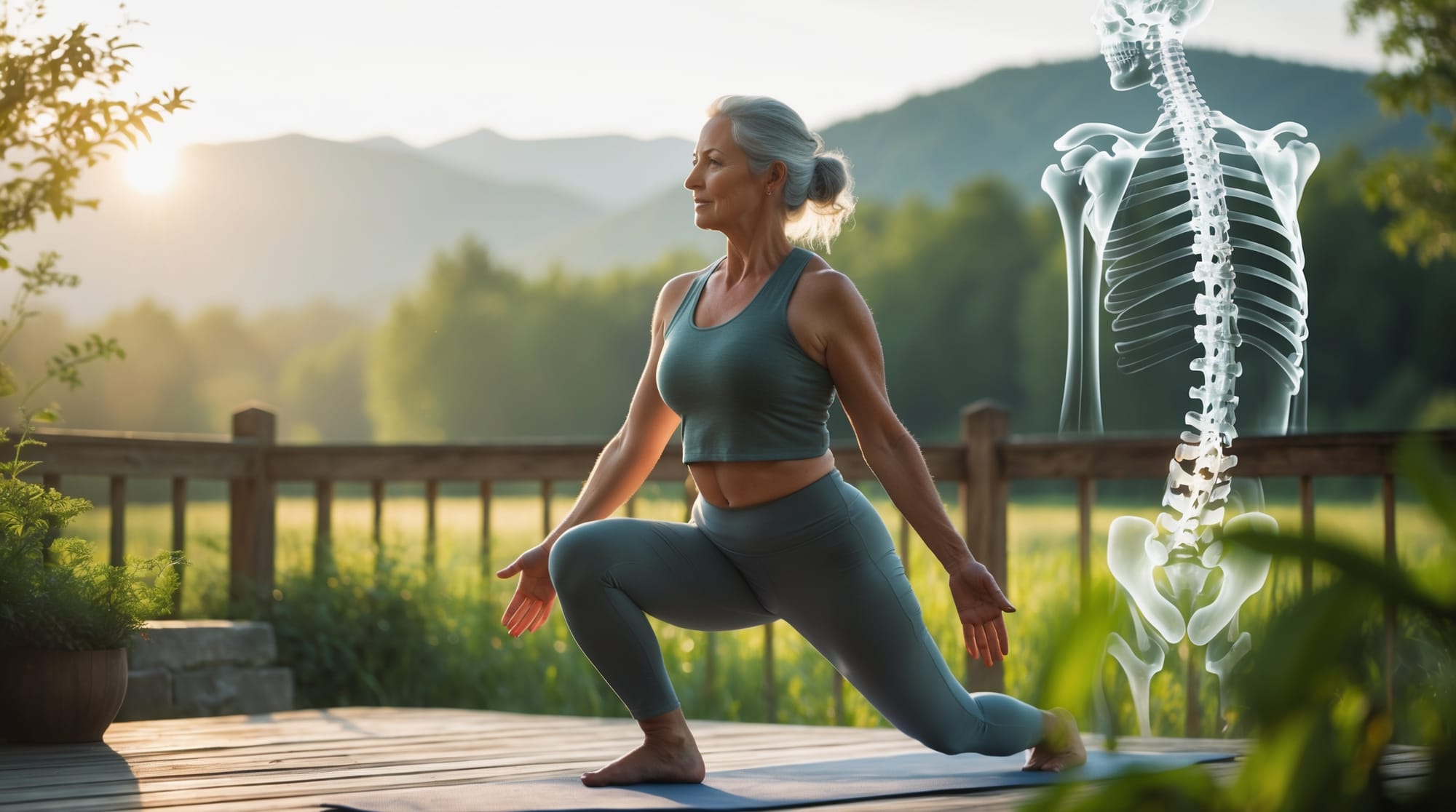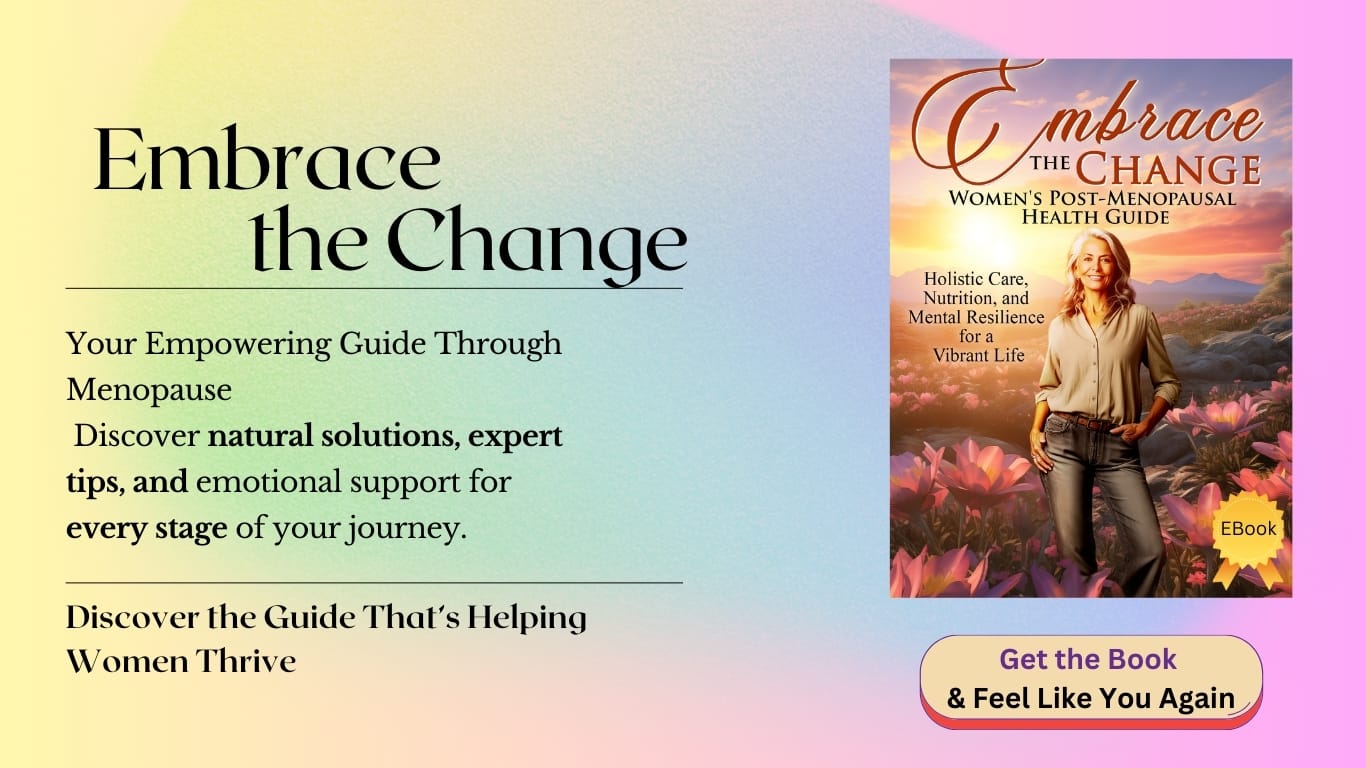Bone Health After Menopause: Preventing Osteoporosis Naturally
As estrogen drops after menopause, bone density declines, raising the risk of osteoporosis. Learn how to support bone health naturally with nutrition, exercise, supplements, and lifestyle tips to stay strong and thrive post-menopause.

Menopause is a big change for women, usually happening in their 40s or 50s. It brings big changes in hormones, like a drop in estrogen. This hormone is key for keeping bones strong. So, it's important to focus on bone health after menopause to avoid osteoporosis naturally.
The time after menopause is key to start good habits for bone health. These habits help prevent osteoporosis.

Key Takeaways
- Menopause leads to a decline in estrogen, impacting bone density.
- Focusing on bone health is crucial in preventing osteoporosis naturally.
- Adopting healthy habits post-menopause supports bone density.
- Understanding nutritional needs can aid in osteoporosis prevention.
- Regular exercise is beneficial for bone health after menopause.
Understanding Bone Health After Menopause
After menopause, women see a big drop in estrogen levels. This hormone is key for keeping bones strong. With less estrogen, bones start to break down faster than they can rebuild. This leads to weaker bones and a higher risk of osteoporosis and fractures.

The link between menopause and bone density is clear. Lower estrogen means bones lose strength and become more breakable. It's vital to focus on bone health after menopause to avoid these problems.
Here's how bone remodeling changes after menopause:
| Aspect | Pre-Menopause | Post-Menopause |
|---|---|---|
| Estrogen Levels | High | Low |
| Bone Resorption | Balanced | Increased |
| Bone Formation | Balanced | Decreased |
| Fracture Risk | Low | High |
Knowing about these changes is the first step to strong bones. A balanced diet and regular exercise can help keep bones healthy. This way, women can lower their risk of osteoporosis and keep their bones strong.
Importance of Calcium in Maintaining Bone Health
Calcium is key for keeping bones strong after menopause. It helps keep bone density up, which fights osteoporosis. With less estrogen, bones lose strength, so getting enough calcium is crucial.

Calcium-Rich Foods
Eating foods rich in calcium is a natural way to stop osteoporosis. These include:
- Dairy products like milk, cheese, and yogurt
- Green leafy veggies like kale and spinach
- Tofu and soy-based foods
- Fortified cereals and juices
These foods give you calcium and other nutrients for health. Eating them often helps keep your bones strong.
Calcium Supplements
If diet alone can't meet calcium needs, supplements are a good choice. They help keep bones healthy by providing calcium for bone density.
There are many calcium supplements, like calcium carbonate and calcium citrate. Talk to a doctor to find the right one for you. Taking these supplements regularly can help prevent osteoporosis naturally.
The Role of Vitamin D in Bone Health
Vitamin D is very important for bone health, more so for postmenopausal women. It helps the body absorb calcium, which is key for strong bones and preventing osteoporosis. Knowing how to get enough vitamin D is crucial for keeping bones healthy.
Sources of Vitamin D
There are many ways to get enough vitamin D. Sunlight is a natural and effective way to boost levels. Also, some foods are rich in vitamin D:
- Fatty fish like salmon and mackerel
- Fortified milk and cereals
- Egg yolks
- Cheese
Vitamin D Supplements
Postmenopausal women often find it hard to get enough vitamin D from food and sunlight. That's where supplements come in. They help make sure the body gets enough vitamin D for bone health.
Adding vitamin D supplements to your routine is easy. There are different types and dosages. It's important to talk to a doctor to find the right one for you. Here's a quick look at some common supplements:
| Type | Description | Recommended For |
|---|---|---|
| Vitamin D2 (Ergocalciferol) | Plant-derived, good for vegetarians | Vegetarians, specific dietary needs |
| Vitamin D3 (Cholecalciferol) | Animal-derived, often better for raising levels | General use, great for bone health |
Following these tips can greatly improve bone health. Knowing about vitamin D sources and keeping levels up is key to preventing osteoporosis and keeping bones strong after menopause.
Exercise for Stronger Bones Post-Menopause
Regular exercise is key to preventing bone loss after menopause. Activities like weight-bearing exercises and strength training help keep bones strong. They protect against osteoporosis and fractures.
Weight-Bearing Exercises
Weight-bearing exercises make your body work against gravity, helping bones grow. Examples include:
- Walking
- Jogging
- Climbing stairs
- Hiking
Strength Training
Strength training, like lifting weights or using bands, is great for bones. It builds muscle, which supports bones. Regular strength training keeps bones dense and lowers fracture risk.
Here's a quick look at weight-bearing exercises and strength training:
| Type of Exercise | Examples | Benefits for Bone Health |
|---|---|---|
| Weight-Bearing Exercises | Walking, Jogging, Hiking | Stimulates bone formation, increases bone density |
| Strength Training | Lifting weights, Resistance bands | Builds muscle mass, supports and protects bones |
Mixing weight-bearing exercises and strength training in your routine boosts bone health. It helps strengthen bones after menopause.

Lifestyle Choices Impacting Bone Health
After menopause, keeping bones healthy is key. Women need to watch their lifestyle choices. This includes avoiding habits that harm bones, like smoking and drinking too much alcohol.
Quit Smoking
Smoking hurts bone health. Cigarettes make bones lose density and raise fracture risks. Quitting smoking is a big step towards better bone health.
Alcohol Consumption
Drinking too much alcohol also weakens bones. It stops the body from absorbing calcium, which is essential for strong bones. Cutting down on alcohol is important for bone health.
| Risk Factor | Impact on Bone Health | Recommended Action |
|---|---|---|
| Smoking | Decreases bone density, increases fracture risk | Quit smoking |
| Alcohol Consumption | Causes significant bone loss | Limit or avoid alcohol |
Hormonal Influence on Bone Density
Women going through menopause face big changes in their hormones. This affects their bone health a lot. Estrogen is key in keeping bones strong. When estrogen levels go down, bones can weaken and the risk of osteoporosis goes up.
Estrogen helps balance the bone-building and bone-breaking cells. When estrogen levels drop, this balance gets upset. This leads to faster bone loss. So, it's important for women in menopause to understand how hormones affect their bones.
Some women might use hormonal therapies to help with bone loss during menopause. These treatments try to keep estrogen levels stable. This can help keep bones strong. But, it's important to talk to a doctor first to see if it's right for you.
| Hormonal Factor | Impact on Bone Density |
|---|---|
| Estrogen | Decreased levels lead to reduced bone density during menopause. |
| Progesterone | Works with estrogen to promote bone health, but its decline also contributes to bone loss. |
So, knowing how estrogen and other hormones affect bones is key. It helps prevent osteoporosis and keeps bones strong after menopause.
Bone Density Tests: Why They Matter
Bone density tests are key for checking bone health, mainly for postmenopausal women. They show how strong bones are and the risk of fractures. This helps in taking steps early to avoid osteoporosis.
When to Get Tested
Postmenopausal women should get regular osteoporosis screenings. How often depends on your risk factors like age, family history, and lifestyle. Early tests can help catch and manage osteoporosis early.
Understanding Test Results
Bone density test results are important for managing bone health. They give a T-score, comparing your bone density to a healthy young adult. This score tells if you have normal bone density, low bone density (osteopenia), or osteoporosis. It helps your doctor choose the best treatment for you.
| T-Score | Bone Health Status |
|---|---|
| -1 and above | Normal Bone Density |
| Between -1 and -2.5 | Osteopenia (Low Bone Density) |
| -2.5 and below | Osteoporosis |

Holistic Approaches to Preventing Osteoporosis
Combating osteoporosis naturally requires a holistic approach to bone health. This means combining a balanced diet, mind-body practices, and lifestyle changes. Together, they help keep bones strong and overall health in check.
Diet and Nutrition
Eating foods rich in calcium and vitamin D is key for strong bones. You can find calcium in dairy, leafy greens, and fortified foods like cereals and juices. Vitamin D is important for absorbing calcium and is found in sunlight, fatty fish like salmon, and supplements.
It's important to mix these nutrients well in your meals for the best bone health benefits.
Mind-Body Practices
Yoga and meditation are crucial for preventing osteoporosis naturally. Yoga improves flexibility and balance, lowering the risk of falls. It also strengthens bones through weight-bearing poses.
Meditation and stress-reducing techniques help keep hormones balanced, which is vital for bone health. Chronic stress can disrupt hormone levels, harming bone density.
By using these holistic methods, you can take a comprehensive approach to bone health. This can help prevent osteoporosis naturally and improve overall well-being.
The Impact of Medical Conditions on Bone Health
Certain medical conditions can greatly affect bone health. It's important to know and treat them. Disorders like rheumatoid arthritis and thyroid imbalances can lead to osteoporosis and other bone density issues.
Medical conditions that affect bone health involve complex biological processes. For example, thyroid and bone health are closely related. An overactive or underactive thyroid can cause imbalances in calcium and phosphate. These minerals are key for strong bones.
Let's take a closer look at how these conditions affect bone health:
| Medical Condition | Impact on Bone Health |
|---|---|
| Rheumatoid Arthritis | Increases the risk of osteoporosis due to chronic inflammation and usage of steroids |
| Hyperthyroidism | Leads to increased bone resorption, resulting in weakened bones |
| Hypothyroidism | Slows bone formation and reduces bone density over time |
Managing these medical conditions is key to protecting bone health. Regular doctor visits and personalized treatment plans are crucial. By understanding how thyroid and bone health are connected, we can tackle these conditions early. This helps maintain a strong and healthy skeletal system.
Supplementing with Bone Health Products
Keeping bones strong after menopause is key. Bone health supplements are a big help. They boost your efforts to keep bones dense and strong.
Choosing the Right Supplements
It's important to pick the right supplements. Look for calcium and vitamin D. These are best when they match your needs and you take them regularly.
Combining Supplements with Diet
Supplements work best with a healthy diet. A diet full of good nutrients helps your bones. This combo gives your bones the best support for strength and health.
Bone Health After Menopause: Preventing Osteoporosis Naturally
Menopause brings big changes to a woman's body, like a drop in bone density. Keeping bones strong after menopause needs a mix of diet, lifestyle changes, and supplements. Looking for natural ways to stop osteoporosis can help keep bones strong.
Eating right is key for bone health during menopause. Foods high in calcium and vitamin D are must-haves. Adding leafy greens, dairy, and fatty fish like salmon to your meals helps a lot. Also, getting some sun boosts vitamin D, helping your body absorb calcium better.
Regular exercise is also vital for bone health after menopause. Activities like walking, jogging, and dancing, along with strength training, help bones grow stronger. These activities help prevent osteoporosis by keeping bones strong.
Changing your lifestyle can also help a lot. Quitting smoking and drinking less alcohol can stop bone loss. These habits can help prevent osteoporosis naturally.
Supplements can also support bone health during menopause. Taking calcium and vitamin D supplements can fill gaps in your diet. Combining these with a healthy diet and exercise is a great way to keep bones strong after menopause.
Using these natural methods to prevent osteoporosis helps women stay healthy and active as they age. By focusing on bone health during menopause, the risk of osteoporosis can be greatly reduced.
| Natural Strategy | Benefits |
|---|---|
| Calcium-Rich Diet | Strengthens bones by providing essential nutrients. |
| Regular Exercise | Increases bone density through weight-bearing and strength training. |
| Lifestyle Adjustments | Reduces bone loss caused by smoking and excessive alcohol consumption. |
| Appropriate Supplementation | Supports dietary intake and boosts bone health. |

Conclusion
Managing bone health after menopause is key to avoiding osteoporosis and staying healthy. A mix of good nutrition, regular exercise, and lifestyle changes can help a lot. Adding calcium and vitamin D, and doing exercises that strengthen bones, are important steps.
It's also crucial to know how hormones affect bones and to get bone density tests often. Quitting smoking and drinking less alcohol can also help protect bones. Mind-body practices and holistic approaches can add extra benefits to your prevention plan.
By making these prevention strategies a part of your daily life, postmenopausal women can live healthier with stronger bones. Taking action early can reduce the risks of bone health problems during menopause. This ensures bones stay strong for a long time.
FAQ
What are the major changes in bone health after menopause?
After menopause, estrogen levels drop a lot. This leads to more bone breakdown than formation. This imbalance raises the risk of osteoporosis and fractures.
How important is calcium for maintaining bone health post-menopause?
Calcium is key for strong bones. Foods like dairy, green leafy veggies, tofu, and fortified cereals help keep bones dense. If you don't get enough from food, supplements can help.
What role does vitamin D play in bone health after menopause?
Vitamin D helps your body absorb calcium. Good sources include sunlight, fatty fish, and fortified foods. Postmenopausal women often need supplements to keep vitamin D levels up.
Which kinds of exercises are beneficial for bone health post-menopause?
Activities like walking and jogging, and strength training, are great. They help build bone and keep it dense.
How do lifestyle choices like smoking and alcohol consumption impact bone health post-menopause?
Smoking lowers bone density and raises fracture risk. Drinking too much alcohol also causes bone loss. It's best to avoid these habits for bone health.
How do hormonal changes during menopause affect bone density?
The drop in estrogen affects bone density. This hormone helps regulate bone metabolism. Hormonal therapies can help support bone health.
Why are bone density tests important for postmenopausal women?
Tests show bone strength and fracture risk. Regular screenings help prevent osteoporosis by identifying individual risks.
How can a holistic approach benefit bone health after menopause?
Eating well and practicing yoga or meditation helps. These activities reduce stress, promote well-being, and support hormonal balance, all good for bones.
Can medical conditions affect bone health after menopause?
Yes, conditions like thyroid disorders and rheumatoid arthritis can impact bone health. Managing these conditions is crucial for maintaining bone density.
What should be considered when selecting supplements for bone health?
Choose the right supplements, like calcium and vitamin D. Use them with a balanced diet to ensure all nutrients work together for bone health.
